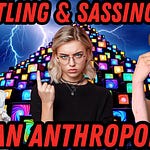In this thought-provoking episode, Malcolm and Simone sit down with Rudyard Lynch, the brilliant mind behind the "What About His" YouTube channel. At just 22 years old, Rudyard has already amassed millions of followers with his insightful commentary on society, religion, and the future of humanity.
The conversation delves into the chilling parallels between the Mouse Utopia experiment and our modern world, exploring how nihilism and anti-natalism threaten the vitality of our civilization. Rudyard shares his perspective on the erosion of art, culture, and genuine human connection in an increasingly cold and impersonal society.
Malcolm and Rudyard discuss the role of religion and mysticism in combating the nihilistic cult that has taken hold of the Western world. They explore the CIA's investigation into the spirit world and the potential for a new, adaptive form of spirituality to emerge as a counterweight to the forces of decay.
Simone highlights the importance of building hidden communities of like-minded individuals to preserve the values of vitality, creativity, and meaning in the face of an increasingly hostile mainstream culture. The trio also touches on the need for a diverse range of historical role models to inspire the next generation of leaders and thinkers.
Join Malcolm, Simone, and Rudyard for a fascinating exploration of the challenges facing our society and the potential paths forward in this age of spiritual and cultural upheaval.
Malcolm Collins: [00:00:00] If you have ever interacted often with, extremist religious types, like Amish people, I was going to say that.
Like, they seem to be more alive than most people that I've met too. Like, you just meet and you're like, whoa! Or like, you'll get this from like really conservative Mormons as well. To the extent where like, it sometimes like throws people off a little. Like, wow, you seem like genuinely happy. I, I don't know if that, that's off putting.
And people will say it is off putting because they find these groups vitality. Condemnation of themselves, but when you meet somebody in a cult like an extractive cult You'll see that they seem kind of dead like they've got these fake smiles But they're not really have any level of vitality to them.
And I think that what we have seen is our society has been taken over by one of these anti vitality nihilistic cults. And now the dangerous part, which really excited me in your video, and you're addressing this as an issue, is those of us who still have a level of vitality, [00:01:00] that are still happy with our lives, still excited about the future, are existentially threatening to the cult.
Because we cause pain, we cause harm. I mean, violence is emotional harm within leftist mindset, you know? What happens next? What happened in Mouse Utopia?
Would you like to know more?
Malcolm Collins: It is so wonderful. Simone and I today have Rubiard with us. He's the guy who runs the What About His channel. Anyone who hasn't seen that channel, you know it has millions of subscribers. It is amazing. I think one of the best channels now, I mean, you're like 21, man, like I am jealous, but not jealous in a way where like, sometimes I look at someone and I'm like, their videos are like, not as good as mine.
Like, how are they so big? I was going through your video recently, one on the mouse utopia experiments. And I think we've talked on this in the past and I was like, wow, this is much better than anything I could have created on this subject. And I And I really love you as a thinker, like, we talk regularly I, I find really aligned with your thinking on [00:02:00] most things, and it's funny, a lot of people know, you know, we are in, well, I'll, I'll get to this later, but what I wanted to focus on was the Nihilist mice in the Mouse Utopia experiment, and that's it.
one to defend against them and their relation to the left. So I'm going to go into this video assuming the audience broadly knows about the Math Utopia experiment. Mice, given anything they want ended up coalescing into urban like clusters and then doing a lot of behavior that looks a lot like our society today.
And then their fertility rate collapsed and their society died. But what was really interesting, and I'll let you lay out this behavior, is this When mice tried to continue to live the old ways, they were victimized. So I'd like you to talk about this, why you think this happened and the correlates you see to society today, and then we can discuss how we might defend against it.
Rudyard Lynch WhatIfAltHist: First of all, thank you so much for having me. And I'm glad to be here. And the way I'll answer your question is that I do a lot of thinking not part of [00:03:00] what a faultist that operates in the back and I gradually filter that into what a faultist and one of the conclusions I've come to is that the soul does exist and the reason I believe that and this will lead to what you're saying because only through understanding the essence of the soul are you capable of seeing how nihilism can take root.
And I came to the conclusion the soul exists partly due to projection where if you're projecting. Your inner care flaws upon the external world. That means there is a part of your mind that is aware of what your inner flaws are. And if you look over history animals do things that are not rational or in their self interest.
And the way I like to see mouse utopia is that you can have multiple tiers of causation for the exact same event. For example, the fall of Rome, you can find about five different. Thing is that resulted in that caused the fall of Rome, and it's almost a Rorschach test for which variables you choose to tease out and are most important.
And with mouse utopia, you can see it starting upon [00:04:00] multiple levels of causation, one being you could look at an ecosystem perspective, or the ecosystem needs to Needs to reset because if one form of life expands exponentially large, it will hurt the entire ecosystem. But when you look at the nihilism for the mouse utopia, there are multiple levels of causation.
One level of causation is that once you are in a pre established wealthy society, there is no incentive to cooperate. So the incentive is to free ride. And that results in negative nihilism because. The end point of free riding is saying that the the non free riders are bad. So nihilism is a way of preventing other people from stopping you from free riding so that you can basically do whatever you want.
The problem though, is you hit tragedy, the common situations where if everyone's trying to stop trying to free ride, there's nothing to free ride off. And. [00:05:00] I also think that past a certain point, people get resentful. If you've reached a certain point in nihilism, you, people, we're emotional. You get resentful against the people who are not like you.
And so it becomes this recursive thing where you hate the reminder that you're doing something wrong. And with the mouse utopia experiment, something that I find very interesting is the thing that kills the other mice. Is not the mice not having kids. It's the nihilist mice killing those who do have kids.
Malcolm Collins: Before you go further, I want to, I want to highlight these ideas you've had because I think they are so powerful and they're really, really like not things to just So within all social animals, whether it's human or mice or anything like that you're going to get some level of self consciousness, it appears.
And this is one of the things that surprised you when you're first looking at the experiment, is how similar the mice were to humans in many ways, when we think of them as being such simple animals. To the extent where if I'm a human and I am living off the state, because no [00:06:00] human wants to see themselves as a bad person or if I am a mouse and I'm just leaving completely indulgently without thinking about the future of my civilization or anything like that, like, that's not really how mice are working, but, but kind of like that but I'm a human and I'm just living completely off the state I need to justify this behavioral pattern.
And so I justify it. In two ways. First with nihilism, nothing really matters because it is not constructive to live off the state. So the only value hierarchy that can justify this behavior pattern is nihilism. And then I begin to, I look at the people who are still putting in the effort and they are a reminder to me, like in leftist thought, Their existence or their ideology causes violence to me, where violence is defined by anything that causes emotional pain.
And it's causing this emotional pain because it's reminding the part of you that is still sane that what you are doing is indolent and self indulgent. And so then you project the hatred out on these other [00:07:00] communities and, You begin to demonize these communities, and then this demonization, and I know I'm just repeating everything you say, but I want to really make sure this sinks in for people because it's so powerful, creates a loop, and in this loop you see these other groups who have maintained these old ways of doing things, or these more natural ways of doing things, and they are still happy with their lives, like they have kids, they are engaged, they have partners, and you, have descended into this cycle of self hatred, which is a result of nihilism, and a result of knowing that you're not actually living for anything other than yourself.
And this cycle gets worse and worse and worse over time, and then what? Continue.
Rudyard Lynch WhatIfAltHist: Sorry, I just You you explained that very well. And the thing which worries me so much about Mastutopia is that it is very close historical parallel, where a method I use to determine because you get studies all the time, most studies are never verified.
They're just scientists can just make stuff up and they'll never be called out for it. [00:08:00] The thing that scares me about Mass Utopia is the parallels you can draw to so many other historic societies, where if you read authors going back to Herodotus you see that this pattern of societies growing wealthy, losing their values, and then collapsing into decadence and getting conquered, is just something that's happened to each of the major civilizations, whether Rome, whether the Mayans, the Persians, the Chinese, whatever.
The thing that I find scary is that we are in the West today at a level of wealth much higher than any of those other societies. So would it not go to reason that we'd have a higher level of decadence? And I think the point that Malcolm was jumping off when we started this is that I said in the video that the thing that shocked me about the new left, because I'll compare my predictions from year to year, and as of four years ago, I was able to predict the left would go crazy.
Because I looked at social justice, I look at the institutions they ran and I realized there was no feedback loop inside social justice des sanity. The thing though, is that we have a hundred years of track record [00:09:00] of leftist insanity already. Look to Cuba, look to Russia, look at China, look at Venezuela, and this current leftist dessan insanity.
It's nihilistic, which is fascinating because the left should, in abstract, be an incredibly optimistic philosophy since they believe utopia is around the corner. But our left has no positive vision of the world, it's just don't. And the thing that really shocks me is Western society is committing social suicide.
And I believe this to be most pronounced in North Europe. Where Sweden, the Netherlands, Germany, they bring in millions of immigrants, and a lot of these countries, they'll be half non native population by 2050 if things don't change, or half of their children, half of the young will not be native population by 2050.
And the thing that really shocked me is degrowth, where I just can't wrap my head around why degrowth is an idea. Because if you look at it from a climate perspective, if the Netherlands just stopped being an economy, it doesn't matter. China is going to keep doing coal. You could [00:10:00] nuke the entirety of Northern Europe and it wouldn't affect the economy, the world's carbon emissions by that much.
And furthermore, these are the kinds of countries that would develop the future climate technology. And so using the left's own chain of logic. There is no justification for the suicide of their societies except it just being a rationalization for them being suicidal. What I
Malcolm Collins: love in the video, you also talked about the erasure of their own history and culture identity in the tearing down of statues, in the tearing down of traditional forms of artistic medium.
And one of the things that you said in the video, which chilled people, it was one of your top comments and I agree with it, is that we have stopped producing art. You had mentioned that when you watch movies today, They don't seem as dynamic, like people don't seem as alive as they did in previous movies.
They, they seem sort of odd and robotic, almost like the souls have left of their body. I'd love you to elaborate on this first too.
Rudyard Lynch WhatIfAltHist: I'm glad you pulled this up because that's one of my favorite things I said in the video, when I'm I'm happy that [00:11:00] people teased it out, but I, I don't watch cable TV, I don't have it in my house.
The only time I do watch cable TV is when I'm at the gym. And so I'll watch Fox News or MSNBC or whatever content they're showing on the gym TV. And it's crazy where I have a good friend of mine who's I have two friends of mine. One is a professional linguistics expert. The other is a professional body language expert.
And so I've heard a lot of stuff from them. And it's crazy where if you look at interviews from 40 years ago, 50 years ago. Everyone's so alive. It's like, you can tell there's a person in there. And now if you look at the TV today, people don't move their heads, right? They don't express that their facial faces that much.
It's like they're puppets. And I know that sounds paranoid, but look at how a puppet moves their body. It's, it's very robotic. And I think. For you who don't know me as a person, one of my massive hobbies outside of what a [00:12:00] Faltist is pop music. I listened to several hours of music every day. I listened to a bunch of different music genres and since the Trump presidency, and I'm just picking that year as a, as a arbitrary date, and I don't think it had anything to actually do with Trump the level of artistic creativity and music has just crashed.
I don't see any new genres. All the content, all the musicians I liked have gone crazy. Across our entire society, we don't make new movies anymore. All our movies are reboots of earlier movies. All of the musical sound today is taking sounds from the 80s. And then rehashing it. I read history. I loved history because it was one of the few fields where you could expect a genuinely good quality of work.
And in the last, since COVID, the new history books that come out, they're more derivative than what came before. So the last field, which I used as a benchmark for, this is something which keeps working, has stopped working. And so, What does our society do anymore? [00:13:00] I'm asking that as a real question. Like,
Malcolm Collins: I want to touch on something you said here, because when you talk about people seeming like off, it's definitely something I've noticed as well.
And it reminds me when you encounter a group that's radically different culturally, you'll often notice either you'll seem to have less life than the society around them or more life than the society around them. If you have ever interacted often with, I think sort of extremist religious types, like Amish people, I was going to say that.
Like, they seem to be more alive than most people that I've met too. Like, you just meet and you're like, whoa! Or like, you'll get this from like really conservative Mormons as well. To the extent where like, it sometimes like throws people off a little. Like, wow, you seem like genuinely happy. I, I don't know if that, that's off putting.
And people will say it is off putting because they find these groups vitality. Condemnation of themselves, but when you meet somebody in a cult like an extractive cult You'll see that they seem kind of dead like they've got these fake smiles But they're not [00:14:00] really have any level of vitality to them.
And I think that what we have seen is our society has been taken over by one of these anti vitality nihilistic cults. And now the dangerous part, which really excited me in your video, and you're addressing this as an issue, is those of us who still have a level of vitality, that are still happy with our lives, still excited about the future, are existentially threatening to the cult.
Because we cause pain, we cause harm. I mean, violence is emotional harm within leftist mindset, you know? What happens next? What happened in Mouse Utopia? What happens to us? And what are your plans for how to get around this?
Rudyard Lynch WhatIfAltHist: Good. So to jump off your point, what you've said about religious people, traditional conservative religious people seeming more alive is true.
When I've, traveling to the Middle East, that's obvious. Going to Egypt, people seem a lot more alive. Moving from California, I spent a couple months in California, now I'm in [00:15:00] Texas. People are much more alive in Texas than they are in California. And the thing that I find interesting is everything we project onto the Victorian period or the 1950s is a reflection of our own society, where if you read Victorian literature.
We pretend the Victorian period is puritanical, emotionally stunted, repressive and cold. And you read books from the 19th century, that's clearly not true. It's a very emotional, dramatic society. I actually think the 19th century, it had romanticism. It was a significantly more emotional society than today.
But because our society is built in opposition to that, we project our failings upon that. Where I think we are actually A very unemotional and cold and stunted society. And so to jump back to the point, you asked me, the thing that terrifies me about Math Utopia is things have to get worse where I imagine it like a treadmill and the treadmill [00:16:00] now is going really fast and it, there's no way out except for these institutions to burn down because you look at academia, you look at Hollywood, you look at these corporations.
There is no counter to wokeness. No one will take over. You would basically need to have a revolution or a coup d'etat that would wipe out the establishment. And I've said in a previous video that I think there's a solid chance that would happen. But aren't all of the major institutions of our society are run.
And of course I do not condone that. I am not
Malcolm Collins: condoning revolution. He's just saying if a revolution starts, consider him for a thought leadership position.
Rudyard Lynch WhatIfAltHist: Hey, that's not what I said, Malcolm. Okay. Okay. Okay. Okay. I live a, I live a peaceful life now. But, but what I was going to say. Is that
Malcolm Collins: is that the mice in the mouse utopia of spirit?
Yes. And we might begin to see that a direct targeting [00:17:00] of the people who are
Rudyard Lynch WhatIfAltHist: still. Yes. And
Malcolm Collins: I can elaborate because this is something that we've talked about offline and I find it really interesting because I think that we, you and I represent two extremes that are actually. Opposed to each other, but it's the same solution to the larger societal problems, which is that we need cohesive new cohesive cultural groups to fight against what's coming if we want any form of protection.
And what's really interesting and where I would point my followers to your channel is people know that we're trying to start like a new cohesive group like, like Simone and I or, or like religious denominational system. But it is incredibly anti Mystic and you are doing, you have like a similar sort of a project, but it is incredibly, I'd say like pro Mystic and it's the smartest of the pro Mystic takes I've ever seen.
So for our audience who is put off by our anti Mystic state, his next video, which I'm excited to see, is on this [00:18:00] time when the CIA I'm excited to see you
Rudyard Lynch WhatIfAltHist: actually, I, I've made this video already, it's just getting approved. Yeah. So talk about it. So. I, for people who don't know me as a person, I am very much in a mysticism, and it's something I study a lot in my free time, and One of the things I've been looking to is the research on psychics and the CIA in the spirit world where the CIA had decades worth of research into the spirit world in where they, they found that it was a real place and they got hundreds of people to visit it on repeat and the military's assessment of the CIA science was that it was all correct.
The Soviets had their own Version of this, which found the same results. And my take is that if every major society in history agrees on this with the 20th century being the one exception in the 20th century, found it to be real. I personally find that to be compelling evidence. I know this is something Malcolm and I agree.
Disagree on, and we're allowed to disagree [00:19:00] but I think our society is so cold and impersonal and why do we do anything? That's something I feel in the subconscious of our society. That we don't, we don't have a sense of why we're living life. And I think that's something that we very much need, and without it we're going crazy.
I was reading a book by an orthodox theologian who said the modern world is divided between those who try to constantly numb themselves to its meaninglessness and those who realize it and go crazy. Yeah.
Malcolm Collins: So I, what I find so interesting about your thought is it is a form of mysticism and mystical thinking.
Yeah. That I think is very compatible with industry and industrial and artistic productivity.
Rudyard Lynch WhatIfAltHist: I mean, I have a Quaker. That's like the ape that, that, or I grew up with a Quaker. That's for those two
Malcolm Collins: mead. But I think that the way that you accomplish this is very interesting in your thought pattern is that the mystical traditions which end up going towards [00:20:00] indolence are based around like secrecy and hierarchy where you have mystical traditions which are dripped down through a hierarchy.
Through a level of like secrecy, whereas your mystical traditions, they approach everything like an investigation or a conspiracy, almost like these things are out there for anyone to find. But it is up to every individual to find them in multiple places. There are no like keepers of knowledge or anything like that.
Yes. And I think that combining it with like actual science and investigative history. Is actually very similar to the forms of mysticism we saw was in productive Victorian period. Like Isaac Newton, he was a mystic, but he wasn't like a general mystic. He was like an occultist who would like research old texts and everything like that.
But anyway, yeah, I'd love to hear
Rudyard Lynch WhatIfAltHist: your thoughts. Thank you. I think the truth is a cone and one of the points I make in the video when I talk to the CI in the spirit world is what these researchers found is there's a geography to the spirit world where there are parts of the [00:21:00] spirit world that appear Abrahamic.
There are parts that appear Indic, parts that appear like reincarnation. So I don't believe there's contradiction between the major worlds religions. I think they're touching a shared truth in different contexts that are useful to their society. And I, I, I don't want to lionize religion and say it's perfect, because the problem is that we can all get fuzzy and agree on that.
But once you actually have to apply it to the real human world and politics, that's when things get messy. Where, ironically, the Christians, the Jews, and the Muslims are theologically very similar. Once you get to the details, though, that's where the pain starts. And and so I do believe there's this shared truth, but the truth, you have to, imagine you have to clean out your attic, you go into the attic, you flash it, use a flashlight there, and if you're not going to shine light upon your attic, you're not going to clean anything, and with these occult traditions that are negative, what you're basically doing is taking people up to the attic, [00:22:00] holding them in hand, They're not showing them the light, so that they have to hold your hand in the attic to survive.
What a good mystic tradition is to flip the light switch. I
Malcolm Collins: love this! That's a good analogy! That's
Simone Collins: very good, yeah.
Malcolm Collins: You see why I like this.
For those who don't understand why we go. So anti mystic with our traditions, I really do recommend the video. Did the CIA discovered the spirit world? I think it's a great example of where taking the mystical path. , can lead a very logical, smart individual. In terms of getting them to circumvent what I would consider. A reasonable amount of incredulity when engaging with information. Ruby or had actually texted us a comment that must've come from one of our Watchers. Under the video, which was something along the lines of, oh dear. I hope Malcolm doesn't feed this. Which I think really shows, [00:23:00] even if you are approaching mysticism from the perspective of.
The, the literal best approach to it, which I do think his approach is, you know, this level of conspiratorial investigation.
Makes the way he is structuring his belief system. Not particularly susceptible to.
Individuals who want to use a person's police system to control a person. Which I really respect about it. But it does burn about, of his incredulity and logic.
Malcolm Collins: Well, I love that you are you know, elevating this within some of your videos as a potential solution, because I really do think it is the only potential solution is a return to theological framings of reality, but that break from the theological framings of, of the old in many ways.
And I'll put a little clip here. The. The old religious traditions that are like, Oh, we'll just do things in that pre industrial way. And this will protect our children from deconversion in the modern world. [00:24:00] It reminds me of
You thinking what I'm thinking, partner? Aim for the bushes. Let's do this. Yeah.
Malcolm Collins: It's like, no, that obviously isn't going to work. The odds are so astronomical against you. We need some level of adaptation and we need to all work together no matter how different our beliefs are. Because whatever those beliefs are, we're the people they're coming after. I mean, there's clearly like the one big bad negative group.
Rudyard Lynch WhatIfAltHist: Yes. I hate churchism or churchism is the continuation of the ceremony of religion without God. And I think most religion in our society is churchism in that, I think a lot of these people don't actually care or want God. I think they use it as an excuse. But if you read the Bible, the God of the Bible is disgusting and insane.[00:25:00]
And it's not the white bread shirts that the Christians that religious people now push. But the problem is that the God of the Bible, that is a force that's in touch with the reality of how horrible life is and how crazy life is. And so. We've been trying too long to domesticate religion, and I believe religions go through cycles, where if you read about what it was like in the Roman Empire, all of the religions were incredibly sterile and political.
And if you were before the Axial Age, under the time of Buddha and Confucius and Plato, it was the same thing. But you have to have these periodic returns of mysticism and chaos to offset the bureaucratization of a religion.
Malcolm Collins: Well, Simone, I want to hear from you because I've been monopolizing this. Well, no,
Simone Collins: I just, what I find interesting and what I think is important for us to recognize is that what we have that the poor rodents in the mouse utopia experiments didn't have was places to hide.
They, they [00:26:00] couldn't hide after a certain point. There was no place where like the per natalist non nihilistic mice could go. I mean, I know the beautiful ones like hid away in some other weird place. I can't
Malcolm Collins: remember. I mean, this is something I always mentioned on the show. The rise of the anti natalist left it up ends something in human history that we always knew there's the famous song.
I don't know if you know the song, At Least the Russians Love Their Children Too, you know, is the refrain. I gotcha. Yeah, this is something that we always knew in history. At least the people who we're fighting against love their children too and want the world to keep existing. We no longer have that belief.
Like, well, but, but, The thought we're fighting against doesn't have children and
Rudyard Lynch WhatIfAltHist: they want us all dead.
Simone Collins: I think that a lot of why the, the perinatalist movement is, So difficult to like quantify or contact is that the conclusion that most of them have come to is we really, really, really need to hide and be careful and not let anyone who know who we are, [00:27:00] what we're building or what our movement or community is like, unless they are 100 percent definitely a trusted insider that we're going to network with in the future.
And I think that's a core part of what is going to enable these groups to move forward in a way that the like more normal per noodle list. Mice or rats could not.
Rudyard Lynch WhatIfAltHist: Their secret base is going to be in Newark, New Jersey. So you guys can keep tabs on that and look nowhere else. And so in the video, I say there are.
Three things you need to do to survive mouse utopia. The first is the first is that you need to, you need to have a sense of, that the anti natalist people can't take over the government, because if they take over the government, they can kill anyone who's trying to survive and have children, and that really worries me, because if you look at mouse utopia, That's what [00:28:00] happens.
And if the government's killing anyone who has children in America, the entire American nation, that's the only way they can die. The second is you need to form communities out, out of the way of like minded, sane people who can support each other. And the third thing is you need religion because religion can provide external moral standards that you can convince a large part of the population to follow as a push against As a push against the chaos of the world.
Malcolm Collins: I couldn't agree more. And I think that's a great point to end on. And we've been so excited to have you on. I would encourage people go check out that, that episode of his. And if you like it, then you need to keep going deep on his channel. Cause he is a great thinker and keep in mind how young he is.
You know, this guy is already, I think one of the leaders of the sort of growing new right thought movement. And he's 20, 21, 22.
Rudyard Lynch WhatIfAltHist: I'm about to turn 23. Yeah,
Simone Collins: [00:29:00] but that's. I think that's an important point is that you are also inspiring to us because you represent what humanity should be doing rather than what humanity is doing.
What we can go back to, quite frankly, again, like Benjamin Franklin was like fully, like acting as though he were an early career adult, like age 12, 13. And then by, you know, his twenties, he was, you know, a major leading thought leader and you were following that path. And you were showing that like, Oh, guess what?
You know, infantilization is not the norm. And look at me. And so we need, we need you to continue to succeed and rise. You
Rudyard Lynch WhatIfAltHist: flatter me. I I grew up in a place where Ben Franklin was taught like 10 times. I'm from Philadelphia. And so I heard about Ben Franklin like 10 times in my childhood.
Simone Collins: Maybe that helped, you know, cause we, well, I mean, people are very suggestible and if we don't have role models, it's a lot harder to like.
realize that you're capable of something if you've never heard of someone else being capable of it.
Rudyard Lynch WhatIfAltHist: So I remember when I was a child, the only historic figure I had heard of was Martin Luther King, because when I was six, that was the only person my school [00:30:00] taught me about. And I think I don't dislike Martin Luther King.
I think he was a great man. But we need to have a broader selection of role models to teach our children. Because I don't know, that
Malcolm Collins: sounds racist to me. It sounds like you're saying we need some white role models. And I don't know if that is
Rudyard Lynch WhatIfAltHist: appropriate. Let's develop a racial quota based upon the demographics of the country.
We can have six out of 10 white Europeans. We can have two Hispanics like Hernan Cortez who was also a white European. And we can have Martin Luther King for our 12 percent black population.
Simone Collins: Well, or we can have what, you know, Jem and I was trying to do before Google decided to apologize, which is just make the founding fathers black.
It's fine. Okay. Like, I mean, honestly, after looking at some of the images generated, I was like, yeah, this looks right. Checks out. Like I can see George Washington is black now, you know, and just, I don't care. I don't care, but you keep doing what you're doing. And we look
Rudyard Lynch WhatIfAltHist: forward to having you back on.
We'll have you back on. [00:31:00] All right, great. Thank you.










